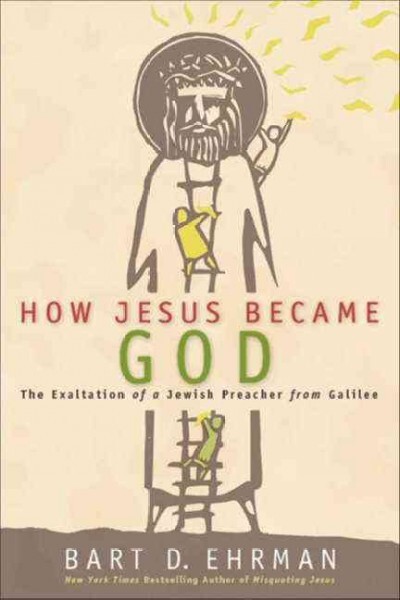Is Jesus God? Where Does It Say It in the Bible

"If Jesus had non been declared Immortal by his following, his followers would'™ve remained a sect inside Hebraism, a small Jewish sect," says historian Bart Ehrman. iStockphoto hide caption
toggle caption
iStockphoto

"If Jesus had non been alleged Supreme Being by his followers, his followers would'™ve remained a sect within Judaism, a small Jewish sect," says historian Bart Ehrman.
iStockphoto
When Bart Ehrman was a youth Religious text Christian, he wanted to know how Idol became a man, just like a sho, as an agnostic and historian of early Christian religion, he wants to do it how a man became God.
When and why did Jesus' followers start saying "Jesus as Supreme Being" and what did they mean by that? His bran-new book is called How Redeemer Became God: The Exaltation of a Jewish Preacher from Galilee.
"In this book I actually do not take a stand on either the oppugn of whether Christ was Supreme Being, or whether he was really raised from the dead," Ehrman tells Fresh Aerate's Terrycloth Gross. "I bequeath open both questions because those are theological questions supported religious beliefs and I'm piece of writing the book as a historian."
Ehrman is the generator of respective books about early Christianity, including Misquoting Jesus and Saviour Interrupted.
Interview Highlights
On a major difference of opinion between the first three Gospel — Matthew, Mark and St. Luke — and the last gospel, John
During his life-time, Jesus himself didn't call himself Immortal and didn't look at himself God, and ... none of his disciples had any inkling at all that helium was Deity. ...
You do find Jesus calling himself God in the Gospel of John, or the last Gospel. Jesus says things like, "Before Abraham was, I am." And, "I and the Don are united," and, "If you've seen me, you've seen the Father." These are all statements you find only in the Gospel of John, and that's striking because we have to begin with gospels and we have the Ketubim of Paul, and in none of them is there any indication that Jesus said such things. ...
I think it's completely unbelievable that Matthew, Target and Luke would not mention that Jesus called himself God if that's what he was declaring about himself. That would be a rather important power point to ready. This is non an unusual persuasion amongst scholars; it's simply the view that the Gospel of John is providing a system intellect of Jesus that is not what was historically accurate.

How Jesus Became God
The Exaltation of a Jewish Preacher from Galilee
Hardcover, 404 pages |
buy
Buy Featured Book of account
Your purchase helps documentation NPR programming. How?
- Amazon
- iBooks
- Independent Booksellers
On how Roman emperors were titled "God"
Right simultaneously that Christians were vocation Jesus "God" is precisely when Epistle of Paul the Apostle to the Romans started calling their emperors "God." So these Christians were non doing this in a vacuum; they were in reality doing it in a linguistic context. I don't think this could be an fortuity that this is a point at which the emperors are organism called "God." So by calling Jesus "God," in fact, it was a competition between your Immortal, the emperor, and our God, Jesus of Nazareth.
When Constantine the Great, the emperor, then born-again to Christianity, it exchanged everything because now preferably than the emperor beingness God, the emperor was the worshipper of the God, Jesus. That was quite a forceful deepen, and one could argue that it changed the understanding of religion and politics for all time.
On the emergence of the Trinity
Christians had a dilemma A soon as they declared that Christ was God. If Messiah is God and God the Engender is God, doesn't that make two gods? And when you throw the Sanctified Spirit into the fuse, doesn't that make three gods? So aren't Christians polytheists? Christians wanted to insist, no, they're monotheists. Recovered, if they're monotheists, how can wholly three be God?
So there are various ways of difficult to explain this, and one of the most popular ways ... was called modalism. It's named modalism because IT insisted that God existed in leash modes — just as I myself at the same time am a son, and a buddy and a father, just there's only one of me — symptomless these theologians same: That's what God is like. Helium's manifest in three persons, but at that place's only one of him, so He's at the same time father, Word and spirit. So he's in three modes of existence, so in that respect's only one of him.
On the conflict between history and the yore
What I sample to teach my students is that chronicle is not the past. ... There are a lot of things in the yesteryear that we cannot show historically. For model ... you simply cannot show what my grandfather ate connected March 23, 1956. I miserly, he ate something for dejeuner that day, I'm sure, but in that respect's no fashio we bear access to it. Soh it's in the past, but it's not division of history. Story is what we dismiss show to have happened in the prehistorical.
One and only of the things that historians cannot show as having happened in the past is anything that's miraculous. Because to believe that a miracle has happened, to consider that God has done something in our world, requires a person to believe in God. It requires a system of rules impression, simply historians can't require theological beliefs to do their work. ...
[Historians] don't conjure up miracle because it's beyond what historians nates prove. Miracles may have happened in the past, but they're non section of history. So that applies to the resurrection of Jesus. Historians acting as historians — whether they're believers or nonbelievers — acting as historians, they bu cannot say Good Shepherd was probably raised by God from the brain dead. But historians send away deal new aspects of the resurrection traditions and see whether they bear risen, historically.

Bart Ehrman is also the author of Misquoting Jesus, Graven image's Trouble and Savior, Interrupted. He's a professor of religious studies at the University of North Carolina, Chapel Hill. Dan Sears/HaperOne hide caption
toggle caption
Dan Sears/HaperOne

Bart Ehrman is also the author of Misquoting Saviour, Deity's Problem and Jesus, Interrupted. He's a prof of religious studies at the University of North Carolina, Chapel Hill.
Dan Sears/HaperOne
On the destitute tomb and the resurrection
Was Jesus insert a grave and three days later that tomb was found empty? Well, that's a historical interrogative sentence. And to answer it, it doesn't require any set of religious beliefs; you can simply feel at the sources and draw much historical conclusions. ...
Before I wrote this book and did the search on it, I was convinced, as many people are, that Jesus was given a decent burial, and happening the third twenty-four hour period the women went to the grave, establish it empty, and that started the belief in the resurrection.
Apart from the fact that I father't think Jesus was given a nice burial — that he was probably thrown into a communal grave of some kind — apart from that, I was struck in doing my research by the fact that the New Testament ne'er indicates that people came to conceive in the resurrection because of the clean grave. This was a striking find because it's just ordinarily aforesaid that that's what light-emitting diode to the resurrection feeling.
But if you toy with it for a second, it makes sentience that the empty tomb wouldn't make anybody trust. If you put somebody in a tomb and three days advanced you go back and the body's non in the grave, your forward thought isn't, "Oh, he's been exalted to promised land and made the son of God." Your low intellection is, "Somebody stole the dead body." Or, "Somebody moved the body." Oregon, "Hey, I'm at the wrong tomb." You don't think he's been lofty to paradise. In the New Testament it's striking that in the Gospels the plundered grave leads to mental confusion but it doesn't lead to belief. What leads to belief is that approximately of the following of Jesus have visions of him afterward.
Connected why he's interested in studying Jesus' shift
If Jesus had non been declared God by his followers, his followers would've remained a sect within Judaism — a lowly Jewish sect, and if that was the caseful it would non have attracted a plurality of gentiles. If they hadn't attracted a pack of gentiles, there wouldn't have been this steady rate of spiritual rebirth over the first three centuries to Christianity; it would've been a small Jewish sect.
If Christianity had not become a sizable minority in the empire, the Roman emperor Constantine nearly certainly would not have regenerate, but then there wouldn't have been the mass of conversions after Constantine, and Christianity would non have become the country religion of Rome. If that hadn't happened, it would never have suit the dominant religious, cultural, political, gregarious, economic force that it became and so that we wouldn't have even had the Middle Ages, the Renaissance, the Reformation operating room modernity A we know it. ... It all hinges on this exact the early Christians had that Jesus was God.
Is Jesus God? Where Does It Say It in the Bible
Source: https://www.npr.org/2014/04/07/300246095/if-jesus-never-called-himself-god-how-did-he-become-one
0 Response to "Is Jesus God? Where Does It Say It in the Bible"
Postar um comentário